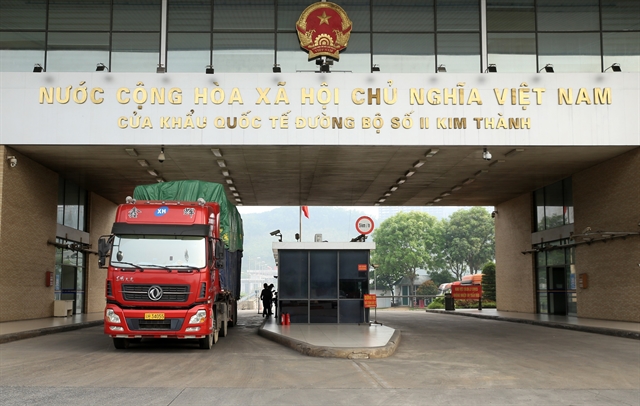As of January 1, 2030, goods will only be processed for import-export procedures at international border gates and main border gates.

Kim Thanh Road No 2 International border gate, Lao Cai Province. — VNA/VNS Photo
From January 1, 2029, residents engaging in cross-border trade, whether buying, selling, or exchanging goods, will be required to complete import-export procedures in person.
Additionally, starting January 1, 2030, goods will only be processed for import-export procedures at specific points, including international border gates, main border gates (bilateral gates), sub-border gates, customs clearance routes, and designated routes for transporting goods at international border gates.
This means that Vietnamese companies will cease unofficial-quota exports to the Chinese market from January 1, 2030.
The changes come following the Government's recently issued Decree No. 122, which amends and supplements certain provisions of Decree No. 14 from 2018 detailing cross-border trade activities.
Under the new decree, in 2029, the Ministry of Finance will report to the Government for consideration and decision on adjusting the number of tax-free allowances and the tax-exempt amount for goods imported through cross-border trade by border residents.
This regulation will also apply to border crossings where administrative procedures for opening or upgrading the gates have been completed, as well as those governed by current laws and bilateral agreements that permit the export, import, and exchange of goods.
Decree No. 122 also amends and supplements Clause 2, Article 4 of Decree No. 14 from 2018, which governs payment methods in border trade activities.
Three payment methods are still allowed, including payments through banks, offsetting payments between exported goods and services and imported goods, services (with the balance settled through banks) and cash payments. However, under the new regulation, cash payments are only applicable to the buying and selling or exchange of goods by border residents.
Decree No. 122 also adds Article 4a, which sets out standards for goods in border trade activities.
Under the new regulation, goods traded across the border by businesses and border residents must meet the standards, quality requirements, traceability regulations and other conditions stipulated by the importing country's laws. — VNS
Read original article here